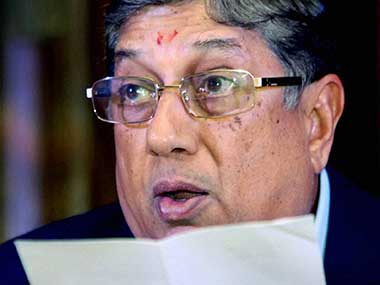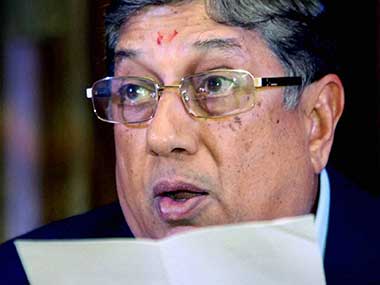All members, the BCCI, is united. And the BCCI is determined to work to justify people’s faith in our tournament and in the BCCI.” – N Srinivasan The BCCI will act without fear or favour if the circumstances warrant to punish any players, team or franchise in the spot-fixing scandal.” - N Srinivasan. If nothing else, the cascade of boos from the Eden Gardens crowd that greeted Srinivasan at last night’s IPL final presentation should have made it clear that the people’s faith is not something he can count on. Whether Srinivasan is willing to admit it or not, the credibility of the league and the board has suffered not only as a result of the allegations of fixing but also the way the board has handled the fallout. The ludicrous denials of Gurunath Meiyappan’s role with the Chennai Super Kings are just the latest example of the hubris with which the BCCI operates. There is plenty of evidence that Meiyappan has been the official face of the franchise for the last four years. And the initial reaction that fixing is just the result of a few bad eggs has been shown up by former BCCI president Shashank Manohar’s public statement that the entire tournament should be investigated. [caption id=“attachment_818921” align=“alignleft” width=“380”]  N Srinivasan, the board president, has set-up a commission to investigate allegations of fixing and gambling in the IPL. PTI[/caption] The fact is the BCCI, with or without Srinivasan, has typically been happy to wear blinkers and not push too hard to uncover anything that might embarrass or expose the board. The CBI report on match-fixing that was released in 2000 practically said as much: “Although, there is no concrete evidence to suggest the direct involvement of any of the members of the BCCI in match fixing, their resolute indifference does give rise to suspicion that there was perhaps more than that meets the eye. It defies credulity to believe that the apex body was oblivious to such rampant match fixing and, therefore, did not find the need to investigate thoroughly the results of matches which are patently questionable.” Not much, if anything, has changed since then. Last year’s sting by India TV resulted in the BCCI taking swift action against the five players that were implicated, but it chose not to investigate further. Some of the players mentioned that owners paid money under the table but Srinivasan refused to even consider the possibility. “All the franchisees are people of stature behind it," he said. It will be wrong to presume they are doing something wrong and then make enquiries.” Surely a board committed to a zero-tolerance approach to corruption would have asked a few polite questions at the very least. But when the president is also a team owner, that might have hit too close to home. In 2012, the Jammu & Kashmir cricket association was rocked by allegations of a multi-crore scam and a police case was registered against two board officials. After a few weeks of revelations, the BCCI eventually swung in to action and announced it would send its auditors to investigate and prepare a report. And then nothing happened. The auditors were reportedly never sent and the police case has been shunted to the back burner after the media attention died down. The Kerala Cricket Association also has a case against it under the Prevention of Corruption Act that names its president and secretary. The complainant, Balaji Iyengar, a chartered accountant and former Kerala junior cricketer, sent the documentary evidence to the BCCI to ask them to take action. He did not even hear back from the board and TC Mathew, the KCA secretary, currently serves on the board’s finance committee. Srinivasan himself is facing a case in the Supreme Court alleging conflict of interest over his roles as BCCI president and the owner of Chennai Super King. “Our nagging question is: can you continue in dual capacity? That is the core issue. We are proceeding on the footing that you had a bar on any dual status before your blanket amendment was brought,” Justice Sudha, speaking for the Bench, said in 2010. Even on those occasions when the board does act, it does so in such a heavy-handed way that its decisions often end up being overturned. The intention seems to be protect its turf and be seen to be acting rather than a genuine attempt to determine the facts. The courts overturned the bans handed out to former captain Mohammad Azharuddin and Ajay Jadeja for match-fixing not on the grounds that they were necessarily innocent, but because the board had violated the principles of natural justice and not given the players a fair hearing. It was a similar case with the Rajasthan Royals and Kings XI Punjab. The board cited material breaches of the franchise agreement in terminating both teams, but it was the teams that won the day over and over again in court, and both were reinstated in the IPL within weeks. And after sacking Lalit Modi in 2010, the board also withdrew its suit against former president Jagmohan Dalmiya over embezzlement of funds from the 1996 World Cup that it filed in 2006. The reason the board gave was lack of evidence. It apparently took them four years to figure out that the case would not hold up in court and the timing just happened to match Modi’s expulsion. If that isn’t enough, earlier this year, the Competition Commission of India slapped a Rs 52.24 crore fine on the board for anti-competitive practices. “The abuse by BCCI was of a grave nature and the quantum of penalty that needs to be levied should be commensurate with the gravity of the violation,” the CCI said in its order. The board has, of course, appealed the decision. Srinvasan has promised a fair investigation into the allegations against Meiyappan “without fear or favour”. But given the board’s history, such a promise must be taken with a heavy helping of salt. The BCCI’s first reaction has always been to close ranks and stonewall. Transparency and openness are not values it embraces. If Indian cricket is to get to the bottom of the fixing and CSK scandal, the BCCI clearly cannot be counted on to do so. Only an outside hand, free of any interference from the board, can hope to uncover the full truth.
The board’s first reaction has always been to close ranks and stonewall. Transparency and openness are not values it embraces.
Advertisement
End of Article
Written by Tariq Engineer
Tariq Engineer is a sports tragic who willingly forgoes sleep for the pleasure of watching live events around the globe on television. His dream is to attend all four tennis Grand Slams and all four golf Grand Slams in the same year, though he is prepared to settle for Wimbledon and the Masters. see more


)
)
)
)
)
)
)
)
)



